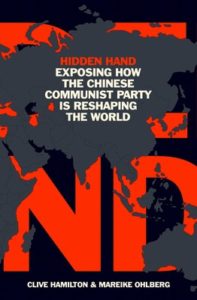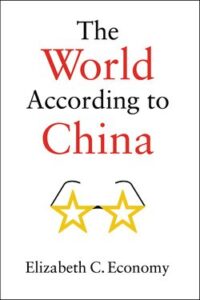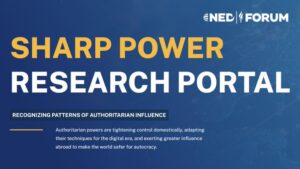These are frightening times for Chinese civil-society activists, non-governmental organizations (NGOs) and private businesses that see their role as building bridges between China and other countries. Nationalist bloggers, supported at times by media outlets controlled by the Communist Party and the People’s Liberation Army, have spent months denouncing groups and individual campaigners for receiving foreign grants, or merely for relaying foreign concerns about China’s growing impact on the world, even in such relatively safe fields as the environment, The Economist reports:
A veteran of the NGO world calls this the worst time for Chinese civil society since 1989. Yet this atmosphere of fear was not triggered by new government policies, or by a wave of arrests. Instead, disconcertingly, some of the most damaging attacks came from previously little-known social-media entrepreneurs. Still more shockingly, the secret weapon of these bloggers is to make anti-foreign bigotry fun. Their core audience is young men aged 18-25. If followers are initially hooked by videos denouncing “anti-China traitors”, their attention is kept with nationalist memes, conspiracy theories and dark in-jokes.
 France will use its EU Council presidency to push for counter-measures (still to be defined) against China to defend Lithuania against economic bullying from Beijing, a senior French government official told POLITICO’s Playbook.
France will use its EU Council presidency to push for counter-measures (still to be defined) against China to defend Lithuania against economic bullying from Beijing, a senior French government official told POLITICO’s Playbook.
The EU needs to learn to wield the power it has, not just to defend its prosperity, but ultimately to defend its democratic ideals, another French official argued. “You can see how we sometimes hesitate to defend our values against China … Why do we hesitate? Because we are not powerful enough, because we want to have access to the Chinese market, because we depend on certain technologies. Power gives prosperity, power gives independence. And if we could all collectively realize that, that it’s better to be powerful than weak, that it’s better to be sovereign than vassal, it would be a great political idea for the EU.”
Systemic competition
“Today, freedom is questioned everywhere, democracy is questioned. Authoritarian regimes, in China or elsewhere, will tell you that they are much better than democracy,” the senior government official said. “We have to prove that democracy is much better than anything else. And that it is more efficient. And that it is fairer.”
 The CCP’s conduct both at home and abroad – its coercive Wolf Warrior diplomacy, assertive military behavior in the Asia Pacific, political influence operations in other countries, and domestic human rights abuses – has caused many countries to rethink their policies toward China, argues Elizabeth Economy, a senior advisor to the U.S. Department of Commerce and author of “The World According to China.” International popular opinion polls reveal record low levels of trust in Chinese leadership and in Xi Jinping, himself. Rather than convince other countries that China is ready to be a responsible global power, for instance, Beijing appears to have persuaded many countries to coalesce in opposition to its leadership, she tells The Diplomat.
The CCP’s conduct both at home and abroad – its coercive Wolf Warrior diplomacy, assertive military behavior in the Asia Pacific, political influence operations in other countries, and domestic human rights abuses – has caused many countries to rethink their policies toward China, argues Elizabeth Economy, a senior advisor to the U.S. Department of Commerce and author of “The World According to China.” International popular opinion polls reveal record low levels of trust in Chinese leadership and in Xi Jinping, himself. Rather than convince other countries that China is ready to be a responsible global power, for instance, Beijing appears to have persuaded many countries to coalesce in opposition to its leadership, she tells The Diplomat.
China’s insistence that its political model qualifies as a democracy – driven by ideologues like Politburo member Wang Huning, the “ideas man” behind Xi – represents a diplomatic innovation that could forecast a plan to forge additional political links with fellow travelers in other governments, according to analysts.
“They’re doing three things at the same time: They’re discrediting U.S. attacks, they’re giving cover to themselves, and they’re giving cover to other authoritarians,” U.S. Army War College research professor Evan Ellis told the Washington Examiner. “It’s an emerging tactic.”
 China’s sharp power is different from traditional forms of public diplomacy through which governments seek to communicate with foreign publics, the National Endowment for Democracy’s International Forum suggests (above). It is not a charm offensive, but an effort to capture elite interests and leverage them for authoritarian preferences.
China’s sharp power is different from traditional forms of public diplomacy through which governments seek to communicate with foreign publics, the National Endowment for Democracy’s International Forum suggests (above). It is not a charm offensive, but an effort to capture elite interests and leverage them for authoritarian preferences.
New narrative
“This is a new narrative,” said Center for New American Security Chief Executive Richard Fontaine. “It’s no model of intellectual consistency, but they seem to think that this has some potential as a counternarrative to the Biden administration’s, in particular, approach of [touting] democratic cohesion, the strength of democracy, the utility and efficacy of democracy, the democracy summit — all of these kinds of things.”
A veteran of the NGO world calls this the worst time for Chinese civil society since 1989. https://t.co/3Z9RpYmGet
— Democracy Digest (@demdigest) January 7, 2022







